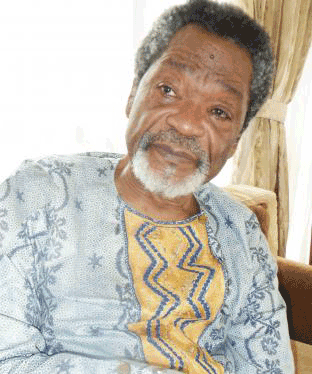Elder statesman, Tunji Braithwaite, is in court to challenge the infringement of his rights by Standard Chartered Bank, which erected a 14-storey building opposite his house in Victoria Island, Lagos, claiming N10 billion as damages. Senior Correspondent, JUDE KENNETH, writes.
“Your freedom ends where my nose begins” is a mid-19th century quote attributed to Supreme Court Justice, Oliver Wendell Holmes Jr. The sound (noise) of electric generating sets and the carbon-monoxide (fumes) they emit constitute a nuisance and therefore turn out to be an infringement on fundamental rights of individuals to unpolluted air and serene environment, especially within a residentially mapped out area.
It is uncommon that most affected people go to court to challenge the infringement of these rights. Often, the infringement is overlooked due to some situations that abound in the country or circumstances that exist beyond somebody’s ability.
One man that braves the odds to challenge these infringements in court is Dr. Tunji Braithwaite, an elder statesman and 1979 presidential candidate for defunct Nigeria Advance Party (NAP). Braithwaite is challenging the ‘illegal’ construction of a 14-storey building with five multi-level car parks, just opposite his house by Standard Chartered Bank.
In the N10 billion court action he slammed against the bank for erecting the building at 142, Ahmadu Bello Way, Victoria Island, and a five-level park at Plot 141 Elias Close, Victoria Island, he averred that the construction of the building by the bank just opposite his house in a purely residential area is unlawful and damaging to his rights.
He is seeking a perpetual injunction restraining the bank or its agents from using the building or causing or permitting it to be used for any purpose other than for residential.
According to him, the N10 billion claims as general damages is for nuisance caused him due to the noise and pollution of the bank’s giant electric generating sets, which led to his great discomfort over the period of 10 years. Besides, the elder statesman asked for interest at the rate of 21 per cent till final judgement.
At the commencement of trial, Braithwaite adopted his written statement on oath from the witness box. Both the claimant and respondent tendered their documents from the bar, and they were all admitted in evidence.
In his testimony, Braithwaite (claimant) stated that at the time he instituted the suit, the bank (respondent) was about to commence its proposed building. He averred that the then proposed building, if erected, would substantially affect the amenities value of his residence in terms of availability of air as well as create constant pollution, thereby breaching the general peace and quietness of the neighbourhood.
He maintained that every plan for development of the various sites suitable for building along the said Elias Close was designed and approved for High Class Residential purposes only, contending that the proposed 14-storey building and car parks would infringe upon his fundamental right to access to light.
Consequently, Braithwaite is praying the court to grant him N10 billion claims as damages and a demolition of the building, disclosing that the Court of Appeal had earlier stopped the bank at the second floor, yet the owners disobeyed and completed the structure.
But in its defence, the bank contended that the trial court lacks jurisdiction to adjudicate upon Braithwaite’s claim because he has failed to fulfil the condition precedent to invoking the action. The bank also denied that the building will constitute any nuisance to the claimant.
The bank further contended that the action and its further prosecution are frivolous, vexatious and abuse of the court process, and consequently urged the court to dismiss the action. It averred that the Lagos State Government reserves the power and authority, acting by itself or through its ministries, parastatals or agencies, to designate or zone any area within the state as residential, commercial and/or mixed uses.
In continuation of the trial penultimate Thurday, Dr. Olatunji Adejumo, an expert witness and senior lecturer in the Department of Urban and Regional Planning of the University of Lagos, while testifying before Justice Doris Okuwobi of Lagos High Court, Ikeja, demonstrated with an electronic device known as Powerpoint, how the 14-storey structure imposed health hazards to the residence of the pro-democracy activist who filed the suit.
Adejumo, who was led in evidence by the claimant, explained that the structure with a five-level car park would generate both heat and noise as well as gaseous fumes from the giant power generating sets, adding that it will make life miserable for people living in the claimant’s home.
Adejumo said: “The five-storey car park will generate both noise and heat that will impact on the mansion of Dr. Braithwaite. In addition to those are the noise and fumes from the giant generators.” He explained that each floor of the car parks was built to take 20 cars, which amounts to 100 cars for the five levels, in addition to 20 other cars to be parked at the premises, stating that all amounted to 120 cars emitting deadly gases to Dr. Braithwaite’s mansion, which is lower in height.
The witness further told the court that the dangerous gases, which would undoubtedly mix with south-western winds, from the simulation performed by his firm, will affect the claimant’s residence negatively. He pointed out that the giant building erected by the defendant would definitely inhibit the required quantity of sun from getting to the claimant’s residence, adding that the structure had no protective membrane against birds and human beings.
Testifying under cross-examination by the defence counsel, Adeniyi Adegbomire, the witness said the Environmental Impact Assessment (EIA) document shown by the defendant did not follow the regulations set out by the federal government. He insisted that the EIA falls short of standard and declared the building plan as suspect.
“The body responsible for approval of building permit in Lagos State is the Lagos State Ministry of Physical Planning, on the instruction and proper vetting of submitted Environmental Impact Assessment to the ministry of Environment or their agency called Lagos State Environmental Protection Agency (LASEPA) to look at the submitted EIA,” he explained.
For the sake of clarity, the EIA Decree 86 of 1992 is to infuse environmental considerations into development project planning and execution. It prescribes the guidelines for EIA studies, spells out the project areas and sizes of projects requiring EIA in all areas of national development and the restrictions on public or private projects without prior consideration of the environmental impact.
EIA is an assessment of the potential impact, whether positive or negative, of a proposed project on the natural environment. It deals with the considerations of environmental impact in respect of public and private projects.
While cross-examining the witness and apparently not comfortable with the unpleasant words used by the witness in answering the questions posed to him, the defence counsel asked for adjournment of the matter. The case was adjourned till November 27 for continuation of trial.














